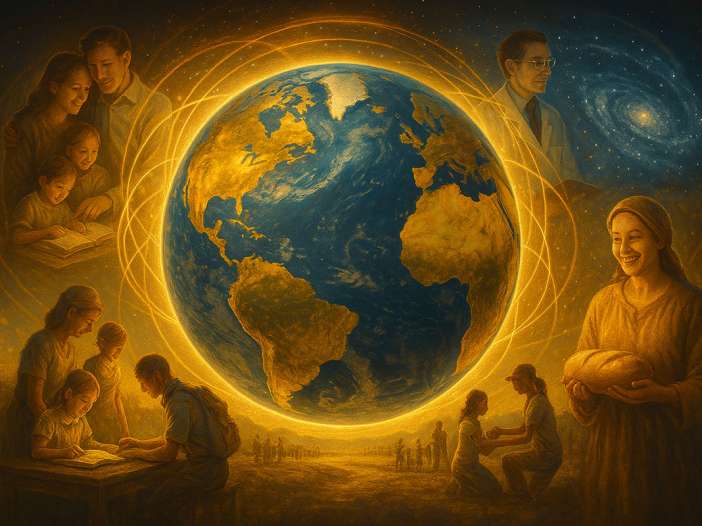
|
Getting your Trinity Audio player ready...
|
Introduction by Jesus
My beloved children, you are called to love one another as I have loved you. The world is weary from selfishness, division, and fear, but the Kingdom of God is not far—it is within you, waiting to be revealed through acts of compassion, justice, and mercy.
Living for the sake of others is not a burden but freedom. When you feed the hungry, clothe the naked, forgive your enemies, and comfort the brokenhearted, you do these things unto Me. In such love, heaven and earth become one.
The teachings you will hear—about family, stewardship, peace, fairness, and sacrifice—are not many paths, but one path: the way of love. Walk in it, and you will find joy beyond measure.
(Note: This is an imaginary conversation, a creative exploration of an idea, and not a real speech or event.)
Topic 1: Radical Compassion in Daily Life

Thích Nhất Hạnh
Compassion is often spoken of as a gentle quality, but when lived deeply, it becomes a radical force that transforms the way we see others and ourselves. My question is: in today’s world—filled with division, fear, and loneliness—what does it actually mean to live compassion in daily life, not just as a feeling but as a practice?
Mother Teresa
Compassion in daily life means noticing the person in front of you. Not in the abstract, but in the very real hunger in their eyes, or the loneliness in their silence. I always told my sisters: small things with great love. It is not grand speeches that change the world, but washing a sick man’s feet or holding the hand of someone dying alone. Compassion becomes radical when we allow interruptions to our schedule to become opportunities to serve.
Bryan Stevenson
I think compassion must also be about truth-telling. If I walk past suffering in prisons, if I ignore the terror of racial injustice, then I am complicit in cruelty. Living compassion in America today means refusing to look away from the broken. It’s choosing to enter into proximity with suffering, even when it’s uncomfortable. To me, that’s radical compassion—it demands courage.
Matthieu Ricard
For me, compassion is training the mind. The heart naturally feels empathy, but the mind can easily close it off when overwhelmed. Through meditation, we cultivate a stable, boundless compassion that doesn’t burn out. In daily life, this looks like pausing before reacting, seeing that the other person, even if aggressive, also wants happiness and freedom from suffering. Compassion is not weakness; it is the strongest force for resilience.
Desmond Tutu
Yes, and we must remember: compassion is joy. It is not dour, it is not only about sacrifice—it is delight in seeing the image of God in another. In apartheid South Africa, when I laughed with those who oppressed me, it was not to trivialize the pain but to remind us both of our shared humanity. Living compassion daily means refusing to let bitterness poison the soul.
Brené Brown
I’d add that compassion requires vulnerability. It’s easy to hand someone a coin and walk away; it’s much harder to look into their eyes and acknowledge their pain—and how it resonates with our own. Real compassion strips away the armor we use to protect ourselves. It says: “I will feel with you, even if it hurts.” That’s radical, because it risks heartbreak every day.
Thích Nhất Hạnh
Thank you. Let us go deeper. Compassion is beautiful in words, but life gives us situations that test us. When confronted with hatred, violence, or betrayal, how do we still choose compassion? How do we keep from hardening our hearts?
Bryan Stevenson
I’ve sat with men who committed terrible crimes. It would be easier to dismiss them as monsters. But I remember: none of us is just the worst thing we’ve ever done. Compassion means holding people accountable while still believing in their humanity. We must resist the narrative that anyone is beyond redemption. That’s how I keep my heart soft—I refuse to give up on people.
Mother Teresa
When faced with hatred, I return to prayer. Alone, I cannot forgive or love an enemy. But with God, I find the strength to see Jesus in the one who wounds me. In Calcutta, I was often cursed, sometimes spit upon. My response was to smile—not out of naiveté, but to remind myself: this soul, too, is beloved of God.
Desmond Tutu
(laughing warmly) My dear, yes! When the South African Truth and Reconciliation Commission began, we faced stories of cruelty that would make your blood run cold. Yet, again and again, I saw victims forgive. Why? Because they chose compassion as liberation. Hatred chains you to your oppressor. Compassion frees you to dance again. So, even in betrayal, I ask: “Do I want to stay chained, or do I want to be free?”
Matthieu Ricard
In neuroscience we see that compassion and anger activate different networks in the brain. If we dwell in hatred, those circuits strengthen. But if we repeatedly practice compassion, the brain rewires itself toward resilience. So, when tested, I breathe. I recall that the person harming me is themselves caught in delusion. Compassion then arises as clarity, not sentiment.
Brené Brown
I think we must acknowledge something: compassion doesn’t mean we accept abuse or allow injustice to continue. Boundaries are compassion, too. When betrayal happens, we can say “No more” and still refuse to dehumanize the other. Radical compassion isn’t about being a doormat—it’s about holding both accountability and connection at the same time.
Thích Nhất Hạnh
Wonderful insights. One final question: if each of us here could offer one practice—a concrete step—that anyone listening could take tomorrow to begin living radical compassion, what would it be?
Matthieu Ricard
Meditate for 10 minutes each morning on wishing happiness to all beings—friends, strangers, even enemies. This daily mental training plants seeds of compassion that grow throughout the day.
Brené Brown
Practice eye contact. Look someone in the eyes—a cashier, a janitor, a child—and silently acknowledge: You matter. You are worthy of love and belonging. It changes both of you.
Mother Teresa
Begin with your family. Smile at your spouse, listen to your child, serve your parents. If you cannot bring compassion into your home, you cannot bring it into the world.
Desmond Tutu
Laugh together. Share joy across differences. Compassion is contagious when it carries laughter, because laughter reminds us of our shared humanity.
Bryan Stevenson
Go where the suffering is. Visit a prison, a shelter, a hospital. You cannot cultivate compassion in theory. It must be practiced in the places of deepest pain. That’s where your heart learns to expand.
Thích Nhất Hạnh
Compassion, then, is not a lofty dream. It is a daily practice—smiling, listening, forgiving, setting boundaries, serving. It is training the heart so it does not close, even under pressure. When we choose compassion each day, we water the seeds of peace in the garden of the world.
Topic 2: Interfaith Bridge-Building
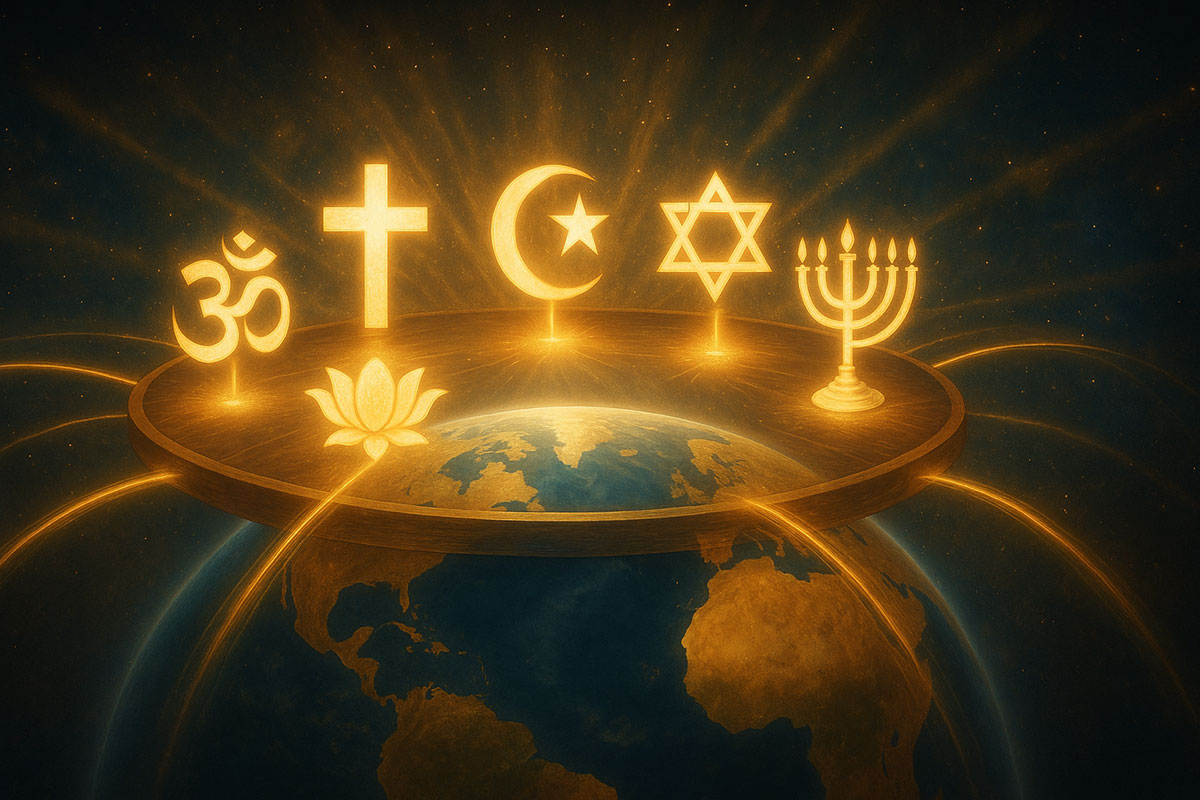
Karen Armstrong
Throughout history, religions have often been at the heart of conflict. Yet they also carry the deepest wisdom for peace. If we are to move beyond division in 2025 and beyond, what does true interfaith bridge-building require? Not just tolerance, but a genuine spirit of unity?
Pope Francis
True bridge-building begins with humility. It means acknowledging that no one faith has a monopoly on truth, and yet, each carries a spark of divine light. I have often said we must walk together—pray together, work together, love together. Unity is not erasing our differences, but harmonizing them in service to humanity.
Rev. Sun Myung Moon
When I spoke of the world as one family under God, it was not poetry—it was the deepest truth. Interfaith unity means seeing every believer, every nonbeliever, as brothers and sisters. If we take God as the Parent of all, then division between religions is like siblings fighting in the same household. Bridge-building means ending that quarrel and becoming partners in God’s dream of peace.
Dalai Lama
Compassion is the common ground. When I meet with Christian, Muslim, Jewish, or Hindu friends, I always return to this: if your practice increases compassion, it is true religion. We must shift focus from doctrine to action, from belief to kindness. That is how trust is built across traditions.
Rabbi Jonathan Sacks
Yes, but we must also honor the dignity of difference. God created diversity, not uniformity. Interfaith bridge-building is not about blending faiths into one, but learning to see the divine in the face of the stranger. When we encounter difference, instead of fear, we can discover a new dimension of God’s truth.
Sheikh Abdullah bin Bayyah
In Islam, we have the principle of ta’aruf—to know one another. The Qur’an says God made us different nations and tribes so that we may know each other. Bridge-building means reviving this divine instruction. It requires respect, dialogue, and above all, service together for the common good.
Karen Armstrong
So much wisdom. But let us be practical: when religions meet, often pride and fear interfere. What are the greatest obstacles you have seen in interfaith work—and how can we overcome them?
Dalai Lama
The greatest obstacle is attachment to identity. People think, “If I accept another religion’s value, I betray my own.” This is false. Appreciating another tradition strengthens your own. The antidote is education—teaching children early that diversity is richness, not threat.
Rev. Sun Myung Moon
The obstacle I have seen is self-centeredness. Too many leaders want to protect their institution more than God’s children. Overcoming this requires living for the sake of others—even when it means sacrifice. If religious leaders would serve humanity first, their barriers would dissolve.
Pope Francis
Another obstacle is indifference. Many believers retreat into their private devotion and forget the wounded world outside. We overcome this by serving together. When Christians and Muslims feed the poor side by side, or Jews and Buddhists plant trees together, the walls fall. Action unites where words may divide.
Sheikh Abdullah bin Bayyah
I would add suspicion. Too often, interfaith dialogue is seen as political maneuvering rather than sincere. To overcome this, we must demonstrate honesty, humility, and shared suffering. If we cry together when a tragedy strikes, if we rejoice together at blessings, trust will grow.
Rabbi Jonathan Sacks
I agree. Fear of loss—loss of truth, loss of authority—haunts interfaith encounters. We must reframe them not as losses but as gains. When I listen to another faith, I don’t lose my own melody—I learn harmony. This is the key: to see diversity not as dilution, but as divine composition.
Karen Armstrong
Thank you. For our final question: if each of you could offer one concrete practice that ordinary people—not theologians, not leaders—could do tomorrow to build interfaith unity in their communities, what would it be?
Sheikh Abdullah bin Bayyah
Invite a neighbor of another faith to share a meal. The table is the oldest bridge in human history. Over bread and tea, fear vanishes.
Dalai Lama
Smile. Truly smile at those of other faiths. A smile is the universal language of compassion, beyond scripture and doctrine.
Rev. Sun Myung Moon
Form interfaith families. When young people of different backgrounds marry and create new homes rooted in love, they embody the oneness of humanity.
Rabbi Jonathan Sacks
Study another’s sacred text—not to convert, but to listen. You may find God speaking in a voice you had not yet heard.
Pope Francis
Serve the poor together. If you want unity, go where suffering is. There, doctrine matters less than love in action.
Karen Armstrong
So we see: interfaith bridge-building is not an intellectual exercise, but a daily practice of humility, service, and love. It begins with meals, smiles, shared action, and a willingness to honor God’s many languages. If we live this way, perhaps religions will fulfill their highest calling—not to divide, but to heal the human family.
Topic 3: Family as a School of Love

Gary Chapman
Families are often called the foundation of society, yet so many today are fractured, rushed, or disconnected. If the family is truly the school of love, how do we make it a place where children, spouses, and even extended relatives can actually learn love? What does it mean to treat family as the first classroom of the heart?
Stephen Covey
A family must be built on intentional principles, not accidents. Just as companies have mission statements, families need shared values that guide behavior. When love is codified into daily practice—respect, listening, service—it becomes teachable. In the family, we don’t just say love is important; we design our interactions so love is practiced.
Iyanla Vanzant
But love isn’t tidy. Families are messy. To make them schools of love, we must first heal generational wounds. You cannot teach love if your own heart is full of unspoken pain. The family classroom begins with honesty—telling the truth about hurt and learning forgiveness. That’s where real love grows.
John Gottman
From research, we know families that thrive practice daily “emotional bids.” These are small moments—a child tugging at your sleeve, a spouse making a joke. Responding positively builds trust and love. When those bids are ignored, relationships wither. The classroom of love is not abstract; it’s built in these micro-moments.
Harriet Lerner
Yes, and love requires differentiation. Families often confuse fusion with love—thinking we must all be the same. But true love allows each member to be distinct, even disagree. In the school of love, one lesson is: I can be myself, and you can be yourself, and we still belong together.
James Dobson
And we mustn’t neglect discipline. Love is not permissiveness. Children learn love when they are guided firmly but fairly. A home without boundaries breeds insecurity. A family of love is one where discipline and affection walk hand in hand.
Gary Chapman
That’s powerful. But let me ask something deeper: families today face enormous stress—divorce, overwork, technology pulling us apart. In such a world, what are the greatest threats to family love, and how can we overcome them?
Harriet Lerner
One great threat is silence. Families avoid hard conversations—about money, addiction, trauma—and that silence rots relationships. Overcoming it requires courage to sit at the table and speak honestly, even when it trembles the air.
James Dobson
Another threat is cultural neglect of family time. Sports, careers, and screens crowd out meals and conversations. We must reclaim the dinner table, the bedtime prayer, the Sunday afternoon walk. Without shared rituals, love fades into convenience.
Iyanla Vanzant
I’d say self-neglect is also a threat. Too many parents pour out for their families but never heal their own wounds. Then resentment grows. We overcome this by doing our own inner work—therapy, prayer, meditation—so we don’t pass brokenness down to our children.
Stephen Covey
Fragmentation is a huge challenge. Everyone runs in different directions, and no one has alignment. The solution is to identify the family’s “big rocks”—the non-negotiables of time and values. Place those first, and everything else arranges around them.
John Gottman
From the data, contempt is the greatest relationship killer. When spouses or parents and children roll their eyes, dismiss each other, or speak with disdain, love cannot thrive. The antidote is cultivating appreciation—daily expressions of gratitude and admiration. This simple habit shields families against the erosion of love.
Gary Chapman
Thank you. One last question: if each of you could give one concrete practice that families could start tomorrow to strengthen love in their homes, what would it be?
John Gottman
Establish a daily “love ritual.” A six-second kiss with your spouse, a bedtime story with your child, a shared morning prayer. These rituals anchor love in everyday life.
Stephen Covey
Hold a weekly family meeting. Share goals, problems, gratitude, and plans. This teaches children that love is proactive, not reactive.
Iyanla Vanzant
Start telling the truth—kindly but clearly. Say what hurts, say what you need, and say what you appreciate. Honesty is the oxygen of family love.
James Dobson
Reclaim the dinner table. Eat together without phones or TV. Conversation over a meal has shaped character for centuries, and it can again.
Harriet Lerner
Practice differentiation. Each week, let every family member express what makes them unique—an interest, an opinion, a dream—and affirm it. Love deepens when we see and celebrate differences.
Gary Chapman
So the family, when tended with honesty, rituals, gratitude, and discipline, becomes the first and most enduring school of love. In such homes, children grow into adults who can love the world—and perhaps, this is where global peace truly begins.
Topic 4: Peaceful Conflict Resolution
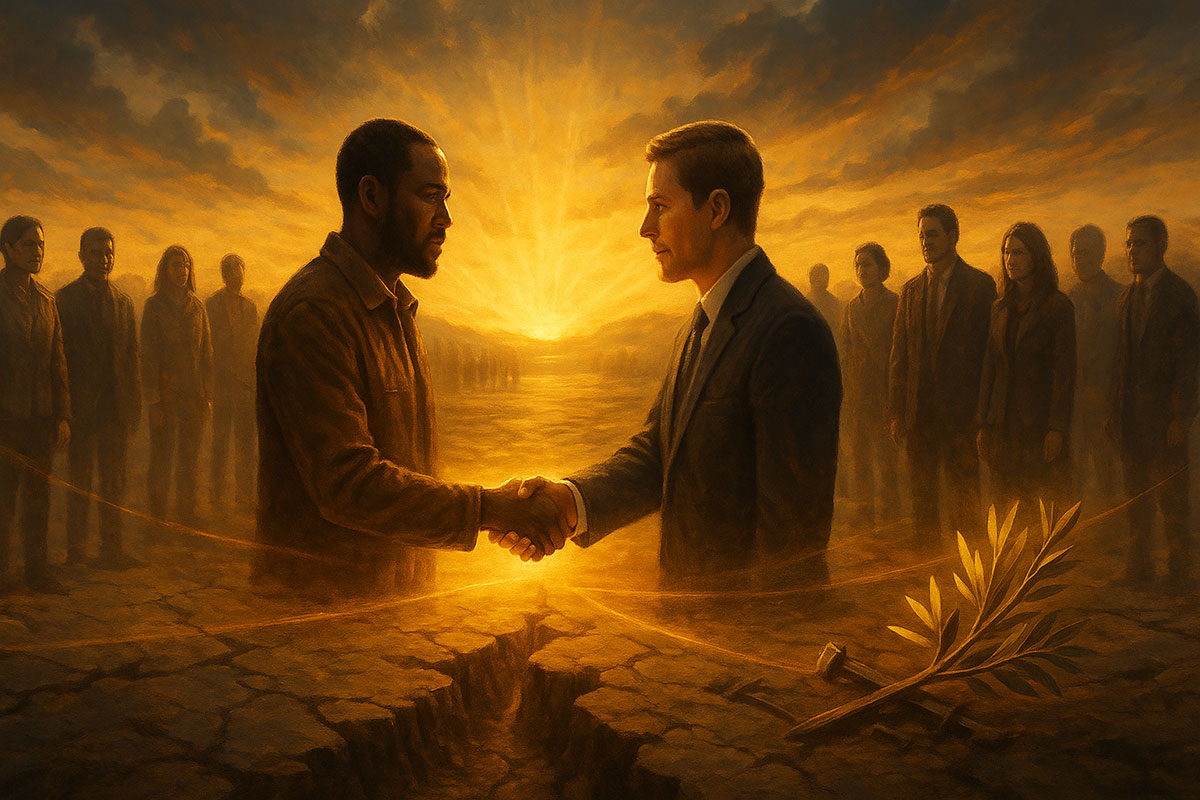
Jimmy Carter
Conflict is inevitable, but violence is not. Around the world, from homes to nations, people are searching for ways to resolve disputes without hatred. My first question is: what does true peaceful conflict resolution require—not just in theory, but in practice?
Nelson Mandela
Peaceful resolution requires courage more than anger. When I was released after 27 years in prison, I could have sought revenge. Instead, I knew South Africa needed reconciliation, not retaliation. True conflict resolution means seeing your former enemy as a partner in building the future. It is not easy, but it is necessary.
Malala Yousafzai
For me, peaceful resolution begins with education. Violence thrives where ignorance rules. If we want to resolve conflicts, we must empower young people—especially girls—with knowledge and hope. When education spreads, extremism loses its power. Peace is not only the absence of war; it is the presence of opportunity.
John Paul Lederach
From decades of work in conflict zones, I have learned this: peace is built from the ground up. Outsiders cannot impose it. It requires listening deeply to communities, acknowledging pain, and creating spaces where adversaries can imagine a shared future. Conflict resolution is less about quick fixes and more about building long-term relationships.
Martin Luther King Jr.
Peaceful resolution demands nonviolence as a way of life. Nonviolence is not passive—it is active resistance to evil, but without hatred for the evildoer. In Montgomery, in Birmingham, we learned that you can fight injustice without destroying the humanity of your opponent. That is the path that redeems both sides.
Leymah Gbowee
I agree. In Liberia, women gathered to pray and protest until the warlords had no choice but to talk peace. We were not powerful in weapons, but powerful in persistence. Peaceful conflict resolution requires ordinary people refusing to give up, even when leaders fail. Women, especially, have a vital role to play.
Jimmy Carter
That leads me to a harder question. Many say nonviolence is naïve, that only force can stop those who are cruel. When faced with aggression, terrorism, or tyranny, how can peaceful resolution still hold? What do we do when the other side refuses peace?
Martin Luther King Jr.
That is the test of faith. The temptation is always to fight fire with fire. But fire only spreads. Nonviolence does not guarantee immediate victory, but violence guarantees cycles of hatred. The oppressor expects you to mirror his cruelty. To answer with love is the only way to break the chain.
Nelson Mandela
Yes, but I must add nuance. There are times when pressure is necessary. In South Africa, sanctions and protests applied force, but not violent force. It was a moral and economic pressure that opened the door for peace. So peaceful resolution does not mean passivity—it can mean strategic pressure without bloodshed.
Leymah Gbowee
In Liberia, we sat in front of the negotiating hall and refused to move until men signed a peace deal. When people said, “What if they attack you?” our answer was: “What if we don’t act?” Sometimes nonviolence means risking your life, but that courage itself shames the aggressor.
Malala Yousafzai
When the Taliban shot me, they thought violence would silence me. Instead, it only proved the weakness of their argument. Aggression cannot be answered with silence, but with courage and persistence. The world must protect those who choose peace. Otherwise, the message to children is that violence always wins.
John Paul Lederach
Peace is sustained not in the moment of conflict, but in the years after. Even when leaders refuse peace, ordinary people can build bridges below. If grassroots reconciliation grows, the political leaders will eventually follow. Tyranny looks powerful, but it is brittle. Relationships are stronger in the long run.
Jimmy Carter
Thank you. Let’s end with something practical. If each of you could offer one step any person could take tomorrow to practice peaceful conflict resolution in their own life—family, workplace, community—what would it be?
Leymah Gbowee
Listen before you speak. Often conflict grows because everyone shouts but no one listens. Listening is the seed of peace.
John Paul Lederach
Find one enemy—someone you distrust—and share a meal. Peace always begins at the table, not on the battlefield.
Malala Yousafzai
Invest in education, even informally. Teach a child, mentor a student, share your skills. Education prevents future conflicts more than any treaty.
Nelson Mandela
Forgive someone who has wronged you. Personal forgiveness is the practice ground for national reconciliation.
Martin Luther King Jr.
Commit yourself to nonviolence—not only in great protests, but in daily interactions. Refuse to insult, refuse to dehumanize. This is how peace is lived every day.
Jimmy Carter
So peace is not just a treaty signed by governments. It is the daily courage to forgive, to listen, to educate, to persist without hate. If enough of us practice this, even the hardest conflicts can yield to the quiet power of peace.
Topic 5: Economic Sharing & Fairness

Muhammad Yunus
The gap between rich and poor has widened to levels unseen in generations. Billions still struggle for food and dignity while wealth concentrates in a few hands. If we are to live “for the sake of others” in economics, what does fairness really look like? What would an economy built on sharing rather than hoarding mean in practice?
Amartya Sen
Economic fairness is about capabilities, not just incomes. True justice means ensuring that every person has the freedom to live a life they value—access to health, education, and security. Sharing, therefore, is not simply redistribution of money, but enabling opportunities. Fairness is achieved when no child is denied the chance to flourish because of where they were born.
Vandana Shiva
Fairness must also include the Earth. Today, corporations privatize seeds, water, and land, leaving farmers destitute. This is theft from future generations. An economy of sharing means protecting the commons—soil, air, rivers—so that life itself is not owned. Without ecological justice, economic justice is impossible.
Peter Diamandis
I would add that abundance is possible. Technology allows us to solve scarcity—solar power, AI, biotechnology can uplift billions. But fairness requires open access. If breakthroughs are locked behind patents for the wealthy, inequality deepens. Sharing innovation—making clean water, energy, and medicine universally available—is the economy of the future.
Thomas Piketty
History shows that unchecked capitalism creates concentration of wealth. Fairness demands structural reform: progressive taxation, inheritance redistribution, public investment in education and health. Charity is not enough—we need institutions that guarantee fairness across generations.
Rutger Bregman
And let’s not forget imagination. We once thought slavery and absolute monarchy were permanent. Now we think extreme inequality is inevitable. But we can imagine universal basic income, shorter workweeks, shared prosperity. Economic fairness begins when we dare to dream differently.
Muhammad Yunus
Some say this is too idealistic. The powerful resist sharing, and inequality feels entrenched. My second question: what are the greatest obstacles to economic fairness, and how can they be overcome in our time?
Thomas Piketty
The greatest obstacle is political capture. Wealth buys influence, and influence protects wealth. Overcoming this requires transparency, democracy that cannot be bought, and strong civil society movements to push for reform. Without breaking the cycle of money and politics, fairness is impossible.
Peter Diamandis
Another obstacle is fear—people fear change. Workers fear losing jobs to automation, companies fear losing profits to regulation. The way forward is to show that abundance is not a zero-sum game. Innovation can create new industries and uplift everyone, if we distribute access wisely.
Vandana Shiva
The obstacle I see is greed disguised as growth. Corporations measure success by GDP, but GDP can rise even while people suffer. We must redefine progress: not how much is consumed, but how well life is sustained. Overcoming greed means a cultural shift—valuing life, community, and ecology above profit.
Amartya Sen
We must also confront inequality in voice. The poor often have no platform. Policies are shaped without their participation. The solution is participatory democracy—giving the marginalized not only resources but a seat at the table. Listening to the silenced is itself an act of economic fairness.
Rutger Bregman
And let’s face it—the biggest obstacle is cynicism. People say: “That’s just the way the world is.” Cynicism protects injustice. The antidote is radical hope. Every great reform—abolition, civil rights, women’s suffrage—was dismissed as impossible until it happened. We must believe fairness is possible, or we will never act.
Muhammad Yunus
Beautiful. Now let us make it practical. If each of you could suggest one concrete step that individuals—or communities—could take tomorrow to promote economic fairness, what would it be?
Rutger Bregman
Start conversations about universal basic income. Advocate, debate, pilot it in your community. This single idea has the power to end poverty permanently.
Amartya Sen
Invest in education locally—tutor a child, support scholarships, build schools. Education equalizes opportunity faster than any other reform.
Vandana Shiva
Buy and grow local food. Every time you support small farmers instead of industrial chains, you strengthen economic fairness and ecological resilience.
Peter Diamandis
Support open-source innovation. Share knowledge, code, or technology freely. The more we democratize innovation, the faster fairness spreads.
Thomas Piketty
Join movements demanding tax justice. Support leaders who will reform tax systems so wealth circulates back into society. Without structural reform, generosity alone will not suffice.
Muhammad Yunus
So fairness is not a utopia—it is a choice. It means shifting from greed to stewardship, from exclusion to participation, from hoarding to sharing. If we live this principle, our economy can become not a battlefield of self-interest but a community of care, where prosperity is measured not by what we take, but by what we give.
Topic 6: Environmental Stewardship as Love-in-Action
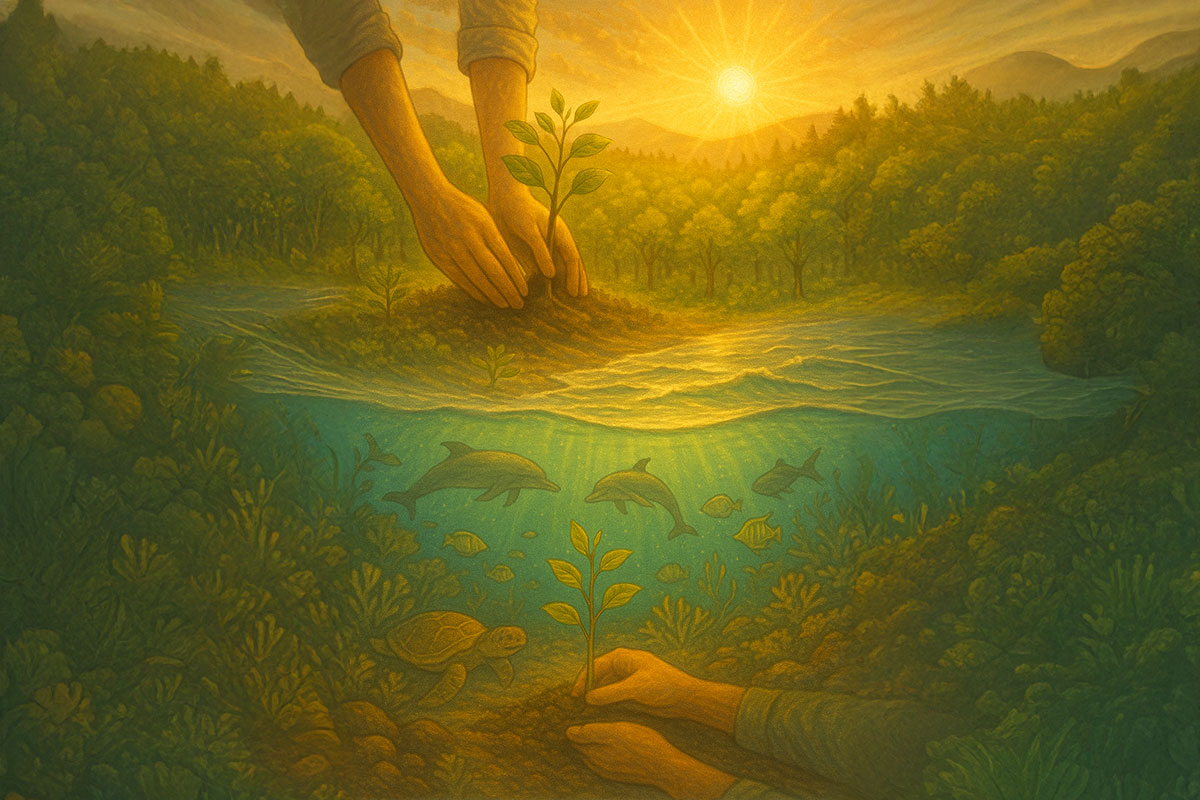
Jane Goodall
When we speak of living for the sake of others, it must also include those not yet born—the future generations who will inherit this planet. My first question is: what does it truly mean to treat environmental stewardship as an act of love, not just duty?
Wangari Maathai
For me, it meant planting trees. Each tree was an act of love—love for the soil, for the women who depended on it, and for the children who would breathe clean air tomorrow. Stewardship is not abstract; it is planting, protecting, and restoring. When we love the Earth, we love humanity, because we are not separate.
David Attenborough
Love is expressed through attention. To love the Earth is to notice its beauty, its delicate balance. I’ve spent my life showing people the wonders of nature so that they might care enough to protect it. Stewardship begins with awe, and awe naturally leads to care.
Pope Francis
In Laudato Si’, I wrote that the Earth is our common home. Stewardship is an act of love because it recognizes creation as a gift entrusted to us. To harm it is to harm ourselves and insult the Giver. Love means tenderness toward every creature, and responsibility toward those who suffer when the Earth is exploited.
Naomi Klein
I’d add that stewardship as love requires justice. Climate change is not only about carbon; it’s about inequality. The poor are hit first and hardest. To love the Earth is to love the people most vulnerable. Stewardship means reshaping our economies so they serve both planet and people.
Bill McKibben
Yes, and I’ll say it plainly: love is incompatible with endless consumption. Stewardship means choosing restraint, choosing community over greed. When we slow down our consumption and speed up our care, we prove that love is stronger than profit.
Jane Goodall
Thank you. My next question: despite this vision of love, powerful forces resist change—corporations, governments, habits of greed. What do you see as the greatest obstacles to true stewardship today, and how can we overcome them?
Naomi Klein
The greatest obstacle is the economic system itself—an engine built on extraction and endless growth. As long as profit is the measure of success, the Earth will suffer. Overcoming this requires bold policies: Green New Deals, public investment in clean energy, divestment from fossil fuels. But it also requires people believing another system is possible.
Bill McKibben
I agree. Fossil fuel corporations are the biggest obstacle. They have lied for decades, sowed doubt, and bought politicians. The way forward is mass movements—millions standing up to say no more. That’s why grassroots climate activism matters.
Wangari Maathai
Another obstacle is hopelessness. People feel too small to make a difference. But when we planted trees in Kenya, one by one, it seemed insignificant. Yet soon millions of trees grew, and women were empowered. Overcoming hopelessness means starting small, together, and believing in growth.
Pope Francis
Spiritually, the obstacle is indifference. People become numb to suffering, deaf to the cry of the poor and the cry of the Earth. We overcome this by cultivating compassion, by teaching that to care for creation is a form of prayer, a sacred duty.
David Attenborough
And I would say the obstacle is ignorance. Many still do not understand how fragile ecosystems are, how quickly they collapse. The antidote is education—documentaries, schools, conversations. People protect what they understand. We must keep showing the truth, again and again.
Jane Goodall
Let us close with something practical. If each of you could offer one action any person could begin tomorrow to live environmental stewardship as love, what would it be?
Wangari Maathai
Plant a tree. It is simple, but it is the most direct way to heal the Earth and honor the future.
Naomi Klein
Join a local climate movement. Individual change is important, but systemic change comes from collective action. Together, we can shift economies and policies.
David Attenborough
Reduce consumption. Buy less, waste less, choose sustainability. Every purchase is a moral act.
Bill McKibben
Divest from fossil fuels. Move your money—bank accounts, pensions, investments—away from destruction and toward renewal.
Pope Francis
Live simply. Choose joy in sufficiency rather than greed in excess. This lifestyle of love becomes a witness to others.
Jane Goodall
So environmental stewardship is not just duty—it is love in action. Love for the soil, for the sea, for the vulnerable, for the generations yet unborn. If enough of us live this way, perhaps we can leave a legacy not of destruction, but of a flourishing planet that testifies: humanity loved well.
Topic 7: Education for Heart & Conscience

Howard Gardner
Education is often measured in test scores and job readiness, but the deepest question is: how do we form whole human beings? My first question is this—what does it mean to educate the heart and conscience, not just the mind?
Maria Montessori
To educate the heart is to prepare the environment so children discover their own dignity. Education is not pouring knowledge into a vessel; it is nurturing the inner life of the child so compassion, curiosity, and responsibility emerge. A true education teaches children not only what to think but how to love.
Daisaku Ikeda
Yes, value-creating education must place human dignity at its core. The purpose of learning is not personal advancement alone, but to contribute to society. A student educated in heart and conscience asks: “How can I use my knowledge to relieve suffering and build peace?”
Paulo Freire
For me, the heart of education is liberation. Too often, schooling becomes indoctrination—children are told what to believe, not how to question. To educate the conscience is to help students read the world as well as the word, to recognize injustice, and to act to transform it.
Malala Yousafzai
Education for the heart means empowering children—especially girls—to believe they matter. When a girl is educated, she becomes a voice for her family, her community, and often for peace. Without conscience, education can be used for cruelty. With conscience, it becomes a force for justice.
Sir Ken Robinson
And let’s remember: education should be joyful. Creativity awakens empathy, because it allows us to imagine another’s perspective. If schools kill creativity, they also kill compassion. To educate the heart is to nurture imagination, because only imagination lets us step into another’s shoes.
Howard Gardner
Thank you. But let’s go deeper. What are the greatest obstacles today to educating not just the intellect, but the whole person—and how can we overcome them?
Paulo Freire
The greatest obstacle is what I called the “banking model” of education, where teachers deposit information and students memorize. This breeds obedience, not conscience. The way forward is dialogue—teachers and students learning together, treating knowledge as a shared act of creation.
Sir Ken Robinson
I would add standardization. Our obsession with standardized testing squeezes the life out of learning. Children are diverse—different talents, different intelligences. If we force them into one mold, we suffocate both heart and mind. We overcome this by personalizing education, celebrating uniqueness.
Malala Yousafzai
Another obstacle is exclusion. Millions of children, especially girls, are still denied school altogether. Without access, there can be no education of the heart. Overcoming this requires political will, community support, and courage from families to demand their children’s right to learn.
Maria Montessori
I see an obstacle in how adults underestimate children. We assume they cannot take responsibility, cannot be moral. Yet I saw even the youngest children choose kindness when given freedom in a respectful environment. The barrier is not the child, but the adult’s lack of faith in the child’s moral capacity.
Daisaku Ikeda
The obstacle is materialism—seeing education only as a path to wealth. This narrows the purpose of learning. We must restore the idea that knowledge exists to enrich life, deepen wisdom, and build solidarity among peoples. Without this shift in values, education becomes hollow.
Howard Gardner
Wonderful. Let me end with this. If each of you could offer one concrete practice—something teachers, parents, or students could do tomorrow to nurture education of the heart and conscience—what would it be?
Maria Montessori
Create environments where children care for plants, animals, and each other. Responsibility and empathy grow naturally when children learn through real, living relationships.
Paulo Freire
Begin every class with dialogue. Ask students what matters to them. Build lessons from their realities, not imposed abstractions. This simple act honors their humanity.
Sir Ken Robinson
Bring the arts back to the center of education. Music, theater, storytelling—they awaken empathy and creativity, the twin engines of conscience.
Malala Yousafzai
Stand up for a child’s right to learn. Whether donating books, supporting schools, or simply encouraging a girl in your community—this act of solidarity changes futures.
Daisaku Ikeda
In every lesson, ask students to reflect: “How does this knowledge help humanity?” This practice plants the seed that learning is for service, not just self.
Howard Gardner
So education for heart and conscience means rethinking school as a place of joy, justice, imagination, and dignity. When we raise children who not only know much but love much, then knowledge becomes wisdom, and wisdom becomes peace.
Topic 8: Service Across Borders with Responsibility
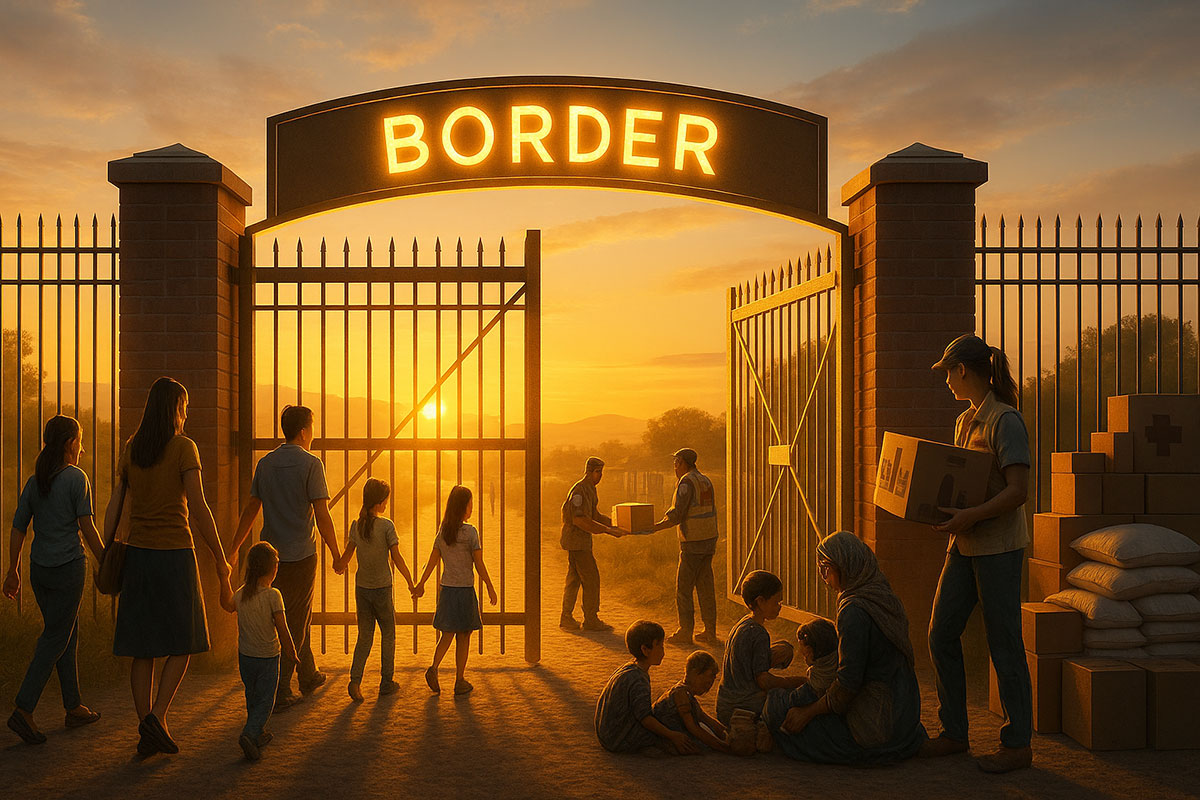
Kofi Annan
Nations today face a delicate challenge: protecting their borders while also responding to humanitarian crises beyond them. My first question is: what does it mean to serve humanity across borders while also ensuring security and order at home?
President Trump
Ladies and gentlemen, the first thing is this: without strong borders, you don’t have a country. Period. You cannot help anyone if your own nation is falling apart. We need to protect our citizens, vet those who come in, and stop criminals and traffickers. But at the same time, America has always been the most generous nation in history. We give foreign aid, we send our military to stop disasters, we feed the world. So—secure the border first, then help responsibly. That’s how you do it.
Madeleine Albright
I agree that order is essential, but compassion must remain central. Nations are strongest when they combine firmness with generosity. Service beyond borders means structured humanitarian aid, resettlement programs, and diplomacy. It is not about throwing open the gates, but about channeling generosity in a way that strengthens global stability.
José Andrés
I’ve seen this firsthand at the border, feeding refugees. Security is the government’s job, yes, but compassion is every human’s job. When people flee hunger or bombs, they are not criminals—they are desperate. Service across borders means we treat them with dignity, even as we follow the law.
Paul Collier
The evidence is clear: unmanaged migration creates instability, but ignoring global suffering also fuels crises that eventually spill across borders. The key is investment—strengthening societies abroad so people are not forced to flee. Secure borders paired with strong development aid is the long-term formula.
Kailash Satyarthi
And let us not forget the children. They should never be lost in politics. Whether at a secure border crossing or in a refugee camp, children deserve protection first. Service across borders means ensuring children are not trafficked, not enslaved, not abandoned.
Kofi Annan
Some argue that generosity without control leads to chaos, while strict control without compassion creates cruelty. My second question is: what are the greatest dangers of getting this balance wrong, and how can we avoid them?
Madeleine Albright
The danger of too much control is dehumanization—treating people as threats rather than as human beings. History has shown us the consequences of shutting our hearts entirely. The way forward is law with humanity—secure borders, but never closed hearts.
President Trump
The real danger is weak borders. We’ve seen what happens—crime, drugs, gangs coming through. If you lose control, your own citizens suffer. And when citizens suffer, they stop supporting any humanitarian effort at all. You want compassion? First prove you can protect your people. Then you’ll have the strength to help others.
Paul Collier
The opposite danger is neglect. If we ignore crises abroad, instability grows, and eventually it reaches our borders anyway. The lesson is that prevention is better than reaction. Invest early, help responsibly, and you avoid massive, destabilizing waves of migration later.
José Andrés
And the danger is forgetting human dignity. I’ve seen mothers carrying babies after walking for weeks. If we only see “illegal” or “legal,” we lose sight of humanity. We must enforce rules, yes, but always treat people with dignity along the way.
Kailash Satyarthi
The greatest danger is when politics forget children. They are not migrants, refugees, or citizens—they are simply children. Whatever our border policies, their rights must come first.
Kofi Annan
Thank you. One last question: if each of you could suggest one action that ordinary people can take tomorrow to practice “service across borders with responsibility,” what would it be?
José Andrés
Support local charities that feed and shelter those at the border. Even small acts of compassion make a difference while the larger policies are debated.
President Trump
Speak up for strong borders—and for fair, merit-based immigration. Tell your leaders you want safety first, but also responsible aid abroad. That’s how we protect our country and still help the world.
Madeleine Albright
Write to your representatives urging support for humanitarian programs that are accountable and transparent. Citizens must demand both compassion and responsibility.
Paul Collier
Invest in stability abroad—support education, job creation, and health programs in fragile countries. The stronger people are at home, the less desperate migration becomes.
Kailash Satyarthi
Protect children everywhere. Support campaigns against child labor and trafficking, and ensure no child is treated as collateral in global politics.
Kofi Annan
So we see: service beyond borders must never mean chaos, nor can it mean indifference. It requires strong borders with open hearts, protection with dignity, and compassion guided by responsibility. Only then can nations remain secure at home while serving humanity abroad.
Topic 9: Unity of Science & Spirituality
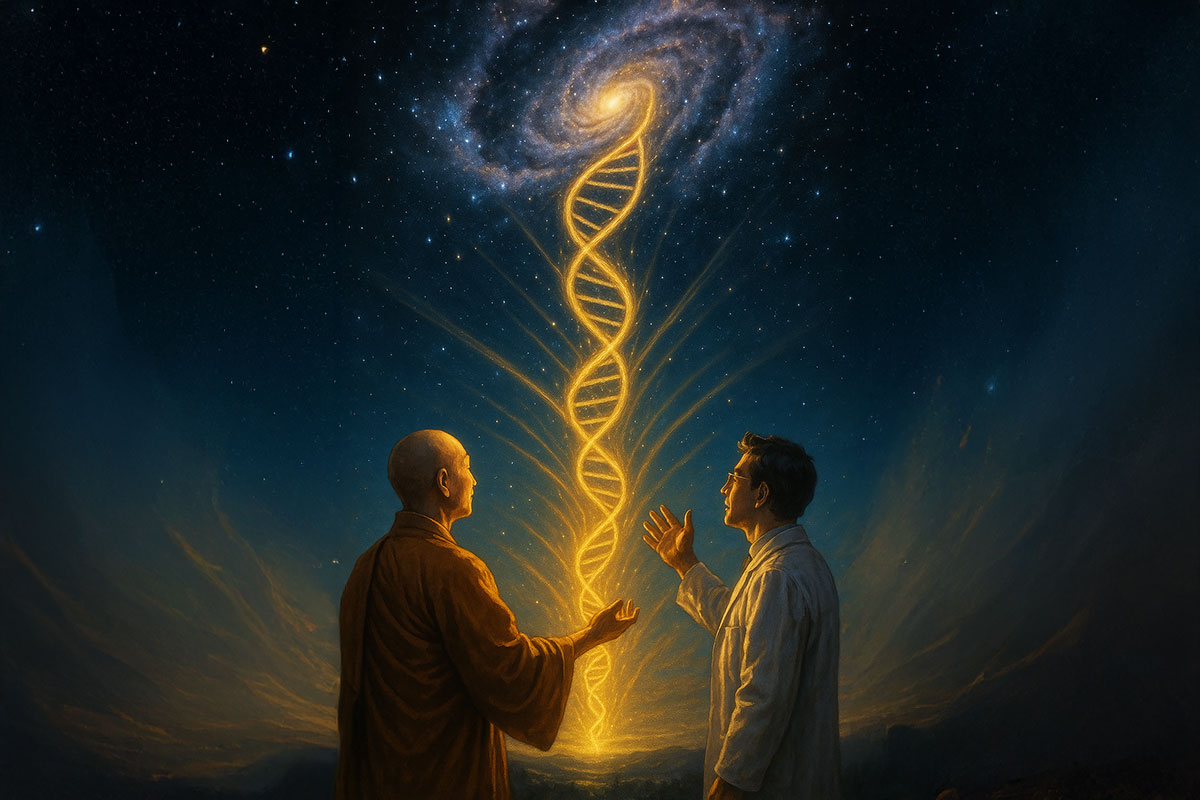
Teilhard de Chardin
For centuries, science and spirituality were treated as opposites—one seeking evidence, the other seeking meaning. Yet in truth, both ask the same question: what is reality, and what is our place within it? My first question is: how do we begin to see science and spirituality not as enemies, but as complementary ways of knowing?
Albert Einstein
I often said, “Science without religion is lame, religion without science is blind.” Science uncovers the laws of the universe, but spirituality gives those laws meaning. The wonder we feel at the cosmos is already a spiritual experience. To me, the scientist who does not sense awe has not yet truly seen.
Deepak Chopra
Yes, and modern science confirms this unity. Quantum physics shows us that matter and consciousness are deeply interconnected. Spirituality explores the subjective experience of consciousness; science maps its objective mechanics. Together, they form a complete picture of existence.
Carl Sagan
I agree that awe is essential. When I look at the pale blue dot, hanging in the vast cosmos, I see not just astronomy but humility. Spirituality, at its best, is this humility before the immensity of the universe. Science tells us what is; spirituality tells us why it matters.
Fritjof Capra
Exactly. In The Tao of Physics, I showed how modern physics parallels ancient spiritual traditions. Mystics spoke of oneness; physicists describe quantum fields. These are not contradictions but convergences. Unity emerges when we stop insisting on one language only and begin listening across traditions.
Brian Greene
I would add: science and spirituality must each stay honest. Science must test, spirituality must inspire. The danger is when one pretends to be the other. But when each honors its role—science revealing structure, spirituality revealing purpose—they enrich one another.
Teilhard de Chardin
Beautiful. But many remain skeptical—scientists who dismiss faith as superstition, or believers who see science as soulless. My second question is: what are the greatest obstacles to this unity, and how can we overcome them?
Carl Sagan
The obstacle is arrogance. Some scientists mock spirituality, some religious leaders deny evidence. Both close doors. The way forward is curiosity—listening with humility. If we admit we don’t have all the answers, unity becomes possible.
Deepak Chopra
Another obstacle is materialism—the belief that only what can be measured is real. Consciousness, love, awe—these are real but not easily measured. Overcoming materialism requires expanding science itself to embrace subjective experience as data.
Albert Einstein
I see fear as the obstacle. Many fear that science will strip away mystery, or that spirituality will constrain reason. But the truth is, science deepens mystery, and spirituality can liberate reason. We overcome fear by realizing both are allies in seeking truth.
Fritjof Capra
The obstacle is fragmentation. Modern life separates knowledge into compartments—physics here, ethics there, spirituality elsewhere. But the universe itself is whole. To overcome fragmentation, education must integrate disciplines, teaching students to see patterns across all fields.
Brian Greene
And the obstacle is misuse. Science used for weapons, spirituality used for dogma. People then associate each with harm. To overcome this, both must be reclaimed for service—to illuminate, to heal, to uplift humanity.
Teilhard de Chardin
Thank you. One last question: if each of you could offer one concrete practice that individuals could begin tomorrow to live the unity of science and spirituality, what would it be?
Deepak Chopra
Meditate daily, then read scientific research on the brain. See how inner experience and outer knowledge reflect one another.
Carl Sagan
Go outside and look at the stars. Let the immensity of the cosmos humble you. That awe is both scientific and spiritual at once.
Albert Einstein
Study nature with reverence. Whether mathematics or music, treat each discovery as a glimpse into the mind of God.
Fritjof Capra
Learn from another tradition. Read a physicist if you are spiritual; read a mystic if you are scientific. Integration begins with crossing your own boundary.
Brian Greene
Support science that uplifts humanity—green tech, medical research—and practice compassion in daily life. Together, this honors both structure and spirit.
Teilhard de Chardin
So we see: the unity of science and spirituality is not a merging into one, but a dance—each complementing, each challenging, each expanding the other. When knowledge and meaning walk together, humanity moves closer to wholeness.
Topic 10: Embody Joyful Sacrifice
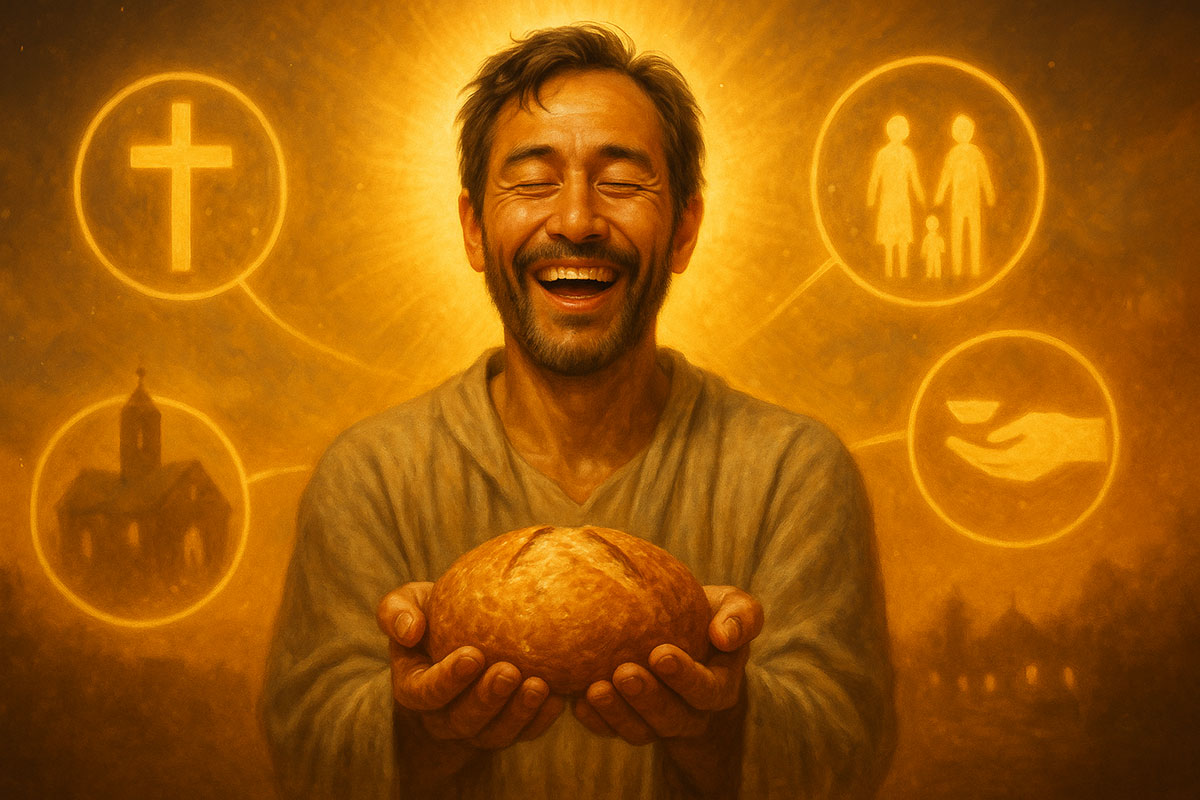
Paramahansa Yogananda
Many people hear the word “sacrifice” and think only of pain or loss. But in truth, the saints and sages have taught us that sacrifice, when rooted in love, brings joy. My first question is: what does it mean to embody joyful sacrifice in daily life—not as suffering for its own sake, but as an offering of love?
Rev. Sun Myung Moon
Sacrifice is not misery; it is love in action. All my life I taught: live for the sake of others. When you give up your comfort for your family, your nation, or humanity, you are not losing—you are gaining the joy of oneness with God. Joyful sacrifice means giving until you feel gratitude rise in your heart.
Viktor Frankl
In the camps, I saw that even in suffering, meaning can be found. Sacrifice becomes joyful when it is chosen freely, when it is tied to a higher purpose. If I endure pain for nothing, it crushes me. But if I endure for love, for dignity, for faith, it uplifts me.
Simone Weil
Sacrifice is consent to necessity. To accept hunger, fatigue, or loneliness for the sake of justice is to align ourselves with God’s will. The joy comes not from pleasure, but from the beauty of obedience to truth. Joyful sacrifice is the secret melody beneath affliction.
Dietrich Bonhoeffer
For me, joyful sacrifice meant resistance against tyranny, even at the cost of my life. True sacrifice is not passive; it is active love. To stand against evil, even if it leads to death, is not despair—it is discipleship. Joy arises when we know we are walking in step with Christ.
St. Francis of Assisi
Ah, my friends, sacrifice is the song of the soul! When I gave away everything, people thought me mad. But I was rich—rich in love, rich in freedom. Sacrifice is joyful because it liberates us from chains. When you own nothing, everything is a gift.
Paramahansa Yogananda
Profound. But let me ask this: the world today is filled with people exhausted by demands—work, family, crises. Many feel they are already sacrificing too much. My second question is: how can sacrifice be kept joyful rather than becoming bitter or burdensome?
Viktor Frankl
The secret is meaning. If sacrifice feels empty, it breeds bitterness. But if we tie our sacrifice to a transcendent purpose—family, faith, freedom—it transforms. Even hardship becomes a source of strength when we see why we endure.
Rev. Sun Myung Moon
Sacrifice becomes bitter only when done unwillingly. If you complain while serving, your spirit closes. But if you offer with gratitude, even the heaviest burden becomes light. Teach your heart to rejoice in giving, and sacrifice will give back more than it takes.
St. Francis of Assisi
Yes! Sing while you serve. Praise while you give. Joy is not found in comfort—it is found in love freely offered. Even when cold and hungry, I sang to Brother Sun and Sister Moon. Gratitude transforms hardship into sweetness.
Simone Weil
We must also accept our limits. Not all sacrifices are holy; some are destructive if they crush the soul. True joyful sacrifice is freely chosen, not coerced. When it is chosen in love, the heart expands instead of shrinking.
Dietrich Bonhoeffer
Sacrifice must also be communal. Alone, burdens weigh us down. Together, sacrifice becomes solidarity. When we carry the cross as brothers and sisters, we discover joy in fellowship.
Paramahansa Yogananda
Yes, beautiful. One final question: if each of you could suggest one simple practice that ordinary people could begin tomorrow to live joyful sacrifice, what would it be?
St. Francis of Assisi
Give something away each day—a coin, a smile, a kind word. In giving, you will discover freedom.
Simone Weil
Fast from one comfort—not to punish yourself, but to remember solidarity with those who lack. Let the emptiness awaken compassion.
Dietrich Bonhoeffer
Speak the truth, even when it costs you. Sacrifice dishonesty for integrity, and you will taste joy.
Rev. Sun Myung Moon
Serve your family before yourself—wake early, prepare something, or pray for them. This daily sacrifice builds a world of love.
Viktor Frankl
When you face hardship, ask yourself: What higher purpose can I serve through this? That question alone can turn suffering into meaningful sacrifice.
Paramahansa Yogananda
So we see: sacrifice is not the end of joy but its beginning. When freely chosen in love, it liberates us, uplifts others, and unites us with the divine. The path of joyful sacrifice is not a burden—it is the soul’s highest song.
Final Thoughts by Jesus
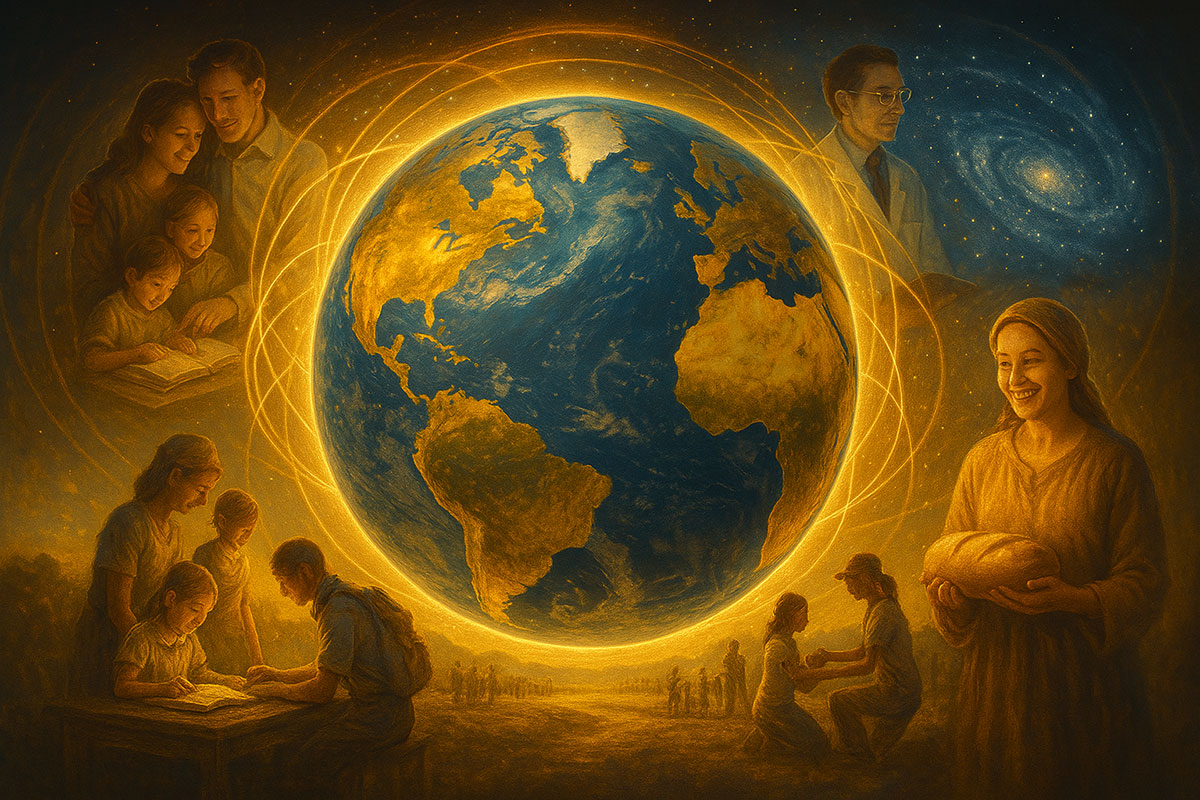
Do not be afraid to give of yourself. Whoever seeks to save his life will lose it, but whoever loses his life for the sake of love will find it. The seed must fall into the ground and die before it bears fruit. So too must you offer yourselves for one another, that the world may live.
Remember, you are the light of the world. Do not hide your light, but let it shine through service, compassion, and truth. In doing so, you bring peace where there is strife, hope where there is despair, and love where there is hatred.
If you live for others, you live for God. And if you live for God, you will never walk in darkness, for love will guide you into eternal life.
Short Bios:
Pope Francis (1936–2025) – Born Jorge Mario Bergoglio, he served as the 266th Pope of the Catholic Church (2013–2025). Known for his humility, outreach to the poor, ecological vision, and emphasis on mercy and interfaith dialogue.
Dalai Lama (1935– ) – The 14th Dalai Lama, Tenzin Gyatso, Tibetan Buddhist spiritual leader and Nobel laureate, revered for his teachings on compassion, nonviolence, and global ethics.
Rabbi Jonathan Sacks (1948–2020) – Chief Rabbi of the UK from 1991 to 2013, philosopher and author who championed moral responsibility and interfaith respect through works like The Dignity of Difference.
Sheikh Abdullah bin Bayyah (1935– ) – Mauritanian Islamic scholar, globally recognized for his efforts in peacebuilding, interfaith dialogue, and countering extremism.
Stephen Covey (1932–2012) – American educator and author of The 7 Habits of Highly Effective People, he emphasized leadership through principles, family unity, and character.
Iyanla Vanzant (1953– ) – Inspirational teacher, author, and spiritual life coach, best known for her work on emotional healing and transformation, including her program Iyanla: Fix My Life.
John Gottman (1942– ) – American psychologist and researcher, internationally respected for his groundbreaking work on marriage stability, emotional intelligence, and family health.
Harriet Lerner (1944– ) – Clinical psychologist and bestselling author of The Dance of Anger, known for her insights on relationships, family systems, and women’s psychology.
James Dobson (1936– ) – Psychologist, author, and founder of Focus on the Family, influential in advocating for family values, parenting, and moral discipline.
Nelson Mandela (1918–2013) – Anti-apartheid revolutionary and Nobel Peace Prize laureate, he became South Africa’s first Black president, symbolizing reconciliation, dignity, and forgiveness.
Malala Yousafzai (1997– ) – Pakistani education activist and the youngest Nobel Peace Prize laureate, survivor of Taliban violence, and advocate for girls’ education worldwide.
John Paul Lederach (1955– ) – Scholar and peacebuilder known for his pioneering work in reconciliation and grassroots conflict transformation in global conflict zones.
Leymah Gbowee (1972– ) – Liberian peace activist and Nobel Peace Prize laureate who led a women’s movement that helped end Liberia’s civil war through nonviolent protest.
Martin Luther King Jr. (1929–1968) – American Baptist minister and civil rights leader, champion of nonviolence and justice, remembered for his “I Have a Dream” speech and ultimate sacrifice for equality.
Thomas Piketty (1971– ) – French economist and author of Capital in the Twenty-First Century, renowned for his analysis of wealth inequality and calls for fair taxation.
Rutger Bregman (1988– ) – Dutch historian and author of Utopia for Realists, known for his advocacy of universal basic income and visionary ideas for social fairness.
Amartya Sen (1933– ) – Indian economist and Nobel Prize laureate, influential for his work on poverty, famine, and development, emphasizing human capabilities and justice.
Vandana Shiva (1952– ) – Indian scholar and environmental activist, a leading voice for food sovereignty, ecological justice, and protection of natural resources.
Peter Diamandis (1961– ) – Entrepreneur and founder of the XPRIZE Foundation, advocate of abundance thinking and using exponential technologies to solve global challenges.
Jane Goodall (1934– ) – British primatologist and conservationist, celebrated for her groundbreaking research on chimpanzees and lifelong environmental advocacy.
Wangari Maathai (1940–2011) – Kenyan environmentalist, founder of the Green Belt Movement, and Nobel Peace Prize laureate for her work linking ecology, women’s empowerment, and democracy.
Bill McKibben (1960– ) – American environmentalist, author, and founder of 350.org, among the first to warn of the dangers of climate change and fossil fuel dependency.
Naomi Klein (1970– ) – Canadian journalist and activist, author of This Changes Everything, recognized for her critiques of capitalism and advocacy for climate justice.
David Attenborough (1926– ) – British broadcaster and natural historian, beloved worldwide for documentaries highlighting the beauty and fragility of the natural world.
Howard Gardner (1943– ) – American psychologist best known for his theory of multiple intelligences, reshaping how we think about learning and education.
Paulo Freire (1921–1997) – Brazilian educator and philosopher, author of Pedagogy of the Oppressed, champion of critical pedagogy and liberating education.
Maria Montessori (1870–1952) – Italian physician and educator, creator of the Montessori method, emphasizing child-led learning and dignity of the learner.
Sir Ken Robinson (1950–2020) – British educator and author, global advocate for creativity in schools and personalized learning.
Daisaku Ikeda (1928–2023) – Japanese Buddhist philosopher, educator, and peacebuilder, president of Soka Gakkai International (SGI), promoting human dignity and peace through dialogue.
Kofi Annan (1938–2018) – Ghanaian diplomat, Nobel Peace Prize laureate, and Secretary-General of the United Nations (1997–2006), known for his commitment to peace and human rights.
Angelina Jolie (1975– ) – Actress and UNHCR Special Envoy, noted for her humanitarian work with refugees and advocacy for global compassion.
José Andrés (1969– ) – Spanish-American chef and founder of World Central Kitchen, renowned for delivering meals in disaster and conflict zones.
Paul Collier (1949– ) – British development economist, author of The Bottom Billion, focused on poverty reduction and responsible global migration policy.
Kailash Satyarthi (1954– ) – Indian child rights activist and Nobel Peace Prize laureate, leading global campaigns against child labor and trafficking.
Albert Einstein (1879–1955) – German-born theoretical physicist, Nobel laureate, famed for relativity theory and reflections on science, religion, and humanity.
Carl Sagan (1934–1996) – American astronomer and science communicator, beloved for Cosmos, inspiring awe of the universe and humility before its vastness.
Deepak Chopra (1946– ) – Indian-American author and physician, pioneer of mind-body medicine and spiritual integration with science.
Fritjof Capra (1939– ) – Austrian-American physicist and systems theorist, author of The Tao of Physics, exploring connections between modern science and spirituality.
Brian Greene (1963– ) – American theoretical physicist, known for work on string theory and bestselling science communication.
Paramahansa Yogananda (1893–1952) – Indian yogi and author of Autobiography of a Yogi, who brought meditation and spiritual unity teachings to the West.
Dietrich Bonhoeffer (1906–1945) – German pastor and theologian, executed for resisting Nazism, remembered for writings on costly grace and discipleship.
Simone Weil (1909–1943) – French philosopher and mystic, whose writings linked suffering, justice, and divine love.
Viktor Frankl (1905–1997) – Austrian psychiatrist, Holocaust survivor, and author of Man’s Search for Meaning, founder of logotherapy.
St. Francis of Assisi (c.1181–1226) – Italian friar and saint, known for radical poverty, humility, and love for all creation.
Rev. Sun Myung Moon (1920–2012) – Founder of the Unification Movement, he dedicated his life to the principle of “living for the sake of others,” promoting world peace, family values, and interfaith cooperation.
Jesus of Nazareth (c.4 BC–c.AD 30/33) – Central figure of Christianity, revered as the Son of God, who taught love, forgiveness, and the Kingdom of Heaven.

Leave a Reply